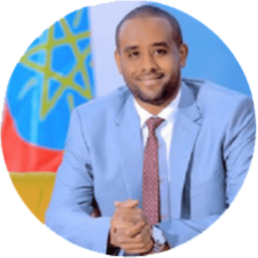Notable Individuals and Entities in Ethiopia’s Digital Battle
Mesfin

Hermela Aregawi
Hermela Aregawi was born in Addis Ababa and moved to the United States shortly after. Raised in an apolitical household, her understanding of Ethiopian politics was limited to reporting by CNN, AP and BBC. She pursued a career in media graduating from Emerson College with a Bachelor of Science in Broadcast Journalism. Hermela worked for a decade as a writer, producer and on-air presenter for various local news agencies, including Aljazeera America. However, prioritizing activism, she suspended her term as a news anchor at CBS Los Angeles in July of 2021.
At the outset of the war in November 2020, while volunteering at an aid distribution center in Tigray, Hermela discovered intentional discrimination against sources of aid by some humanitarian agencies in order to avert accountability and redirect resources to war efforts. Disassociating from these groups, she questioned and reexamined her initial understanding of the conflict.
Currently, Hermela works with independent news organizations to combat propaganda and false narratives concocted by the TPLF and promulgated by mainstream media outlets. Though she is subject to online harassment, and threats, she continues to encourage Ethiopians to be active participants in the telling of their stories. This is exemplified through the #NoMore movement she spearheaded this November; a social media campaign which unites people from across Africa and the diaspora in their fight to end great-power politics and meddling in African nations.
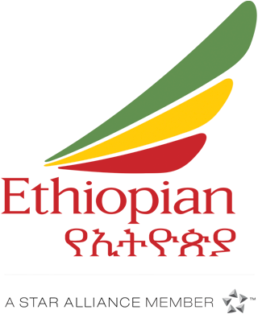
Ethiopian Airlines
Ethiopian Airlines (ET), having started operations in April of 1946, is the largest and most profitable airline in Africa. Annually, with 116 international 23 national and 44 freighter destinations, it services 5.2 million passengers and 500 tons of freight through its main hub in Addis Ababa.
Although the airline is publicly owned by the Ethiopian government, it is managed autonomously. This private management, unlike most African state-owned airlines, protects against nepotism and politically influenced business decisions. Where government regulations, and protectionism plague African airlines, Ethiopian Airlines greatly benefits from governmental support in the form of tax exemptions and special loans, allowing for the redistribution of revenue for investments and other improvements. Consequently, it has become the most profitable airline in Africa due to its three pronged approach: strategic network building, decentralized management structure, and diversification of income streams.
But similar to the experiences of other Ethiopian institutions, the conflict in the North has exposed ET to defamation campaigns in the digital space through crusades like Boycott Ethiopian Flowers and the amplification of falsehoods about the use of Ethiopian aircrafts to transport weapons in Ethiopia’s Tigray crisis. Both campaigns, propagated by partisan critics like Martin Plaut and Nima Elbagir, did little to damage the airline’s profit margins with 95 million stems sold during the valentine’s season and the Airline earning a revenue of 3.3 billion dollars in 2021.
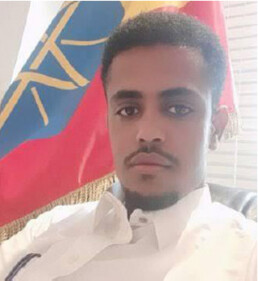
Suleiman Abdella
Suleiman Abdella, born in Dessie, is amongst the Ethiopian Diaspora living in Saudi Arabia. Since January of 2020, he has used his Arabic language skills to translate and share Arab perspectives on the Grand Ethiopian Renaissance Dam,which would otherwise be inaccessible to the Ethiopian public. Suleiman is a self-prescribed digital diplomat who uses his Twitter and Facebook accounts to combat unsubstantiated narratives and unpack biased reporting.
Acknowledging the deep mistrust the community has towards traditional media, Suleiman works to rebuild that trust as one of many independent voices providing evidence-based narratives for both internal and external audiences.
Suleiman advocates for increased participation of the Ethiopian community so as to provide a varied and honest depiction of the reality on the ground. His resolve in countering harmful claims, particularly as it relates to GERD, dubs him a pioneer in digital advocacy.
Share
ከአምባሳደር ሬድዋን ሁሴን ጋር የተደረገ ቃለመጠይቅ
አምባሳደር ሬድዋን ሁሴን የኢትዮጵያ ውጪ ጉዳይ ሚኒስቴር;አምባሳደር ሬድዋን ሁሴን የኢትዮጵያ ውጪ ጉዳይ ሚኒስቴር; ሚኒስትር ዴታ ከሆርን ሪቪው ጋር በወቅታዊ አገራዊሚኒስትር ዴታ ከሆርን ሪቪው ጋር በወቅታዊ አገራዊ ጉዳዮችና በሚኒስቴሩ ስለታቀዱ ለውጦች እንዲሁም በ 2022ጉዳዮችና በሚኒስቴሩ ስለታቀዱ ለውጦች እንዲሁም በ 2022 ስለሚጠበቁት ስለሚጠበቁት ጉዳዮችን ጉዳዮችን በተመለከተ በተመለከተ ቃለመጠይቅ ቃለመጠይቅ አድርገዋል፡፡
አምባሳደር ሬድዋን ሁሴን
የኢትዮጵያ ውጪ ጉዳይ ሚኒስቴር; ሚኒስትር ዴታ
የኢትዮጵያ ውጪ ጉዳይ ሚኒስቴር
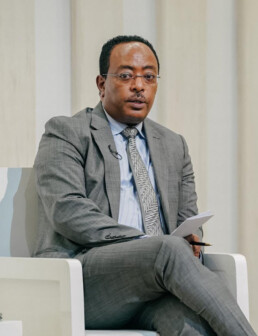
ሆርን ሪቪው:አምባሳደር በመጀመሪያ ይህንን ቃለመጠይቅ ለማድረግ ጊዜ ስለሰጡን ማመስገን እንፈልጋለን፡፡ ኢትዮጵያ ባለም ላይ ስለምትገኝበት ሁኔታ ይሄንን ያለፈውን ዓመት እንዴት ይገልጹታል?
2021 ኢትዮጵያ ብዙ ውጣ ውረዶች ያለፈችበት ጠመዝማዛ ጉዳዮች አስቸጋሪ ክስተቶች የተከሰቱበትና የፖለቲካ መጠማዘዞች የነበሩበት ዓመት ነበር፡፡ ይህም ኢትዮጵያ የሚታመኑ ወዳጆቿን ከደግ ጊዜ ብቻ ወዳጆቿ ለመለየት ረድቷታል፡፡ ይህ ያለፈው ዓመት የቀጠናችንና ዓለም አቀፍ አጋሮቻችንን ፍላጎቶችና ስሜቶች አሳይቶናል፡፡ በህግ የተመረጠው የኢትዮጵያ መንግስት ላይ የጫና ዘመቻ በማድረግ ወደነርሱ ፍላጎቶች ለማዘመም ሲሞከር በማያሻማ ሁኔታ ተመልክተናል፡፡ እንደማንኛውም አገር ኢትዮጵያም የራሷ የውጪ ጉዳይ ፍላጎቶችና ምርጫዎች ያለው ፖሊሲ ስላላት የውጪ ሀይሎች በፈለጉት ጉዳይና ሀሳብ ሊገዛ አይጠበቅበትም፡፡ በአሁኑ ጊዜ በሰሜኑ ከተከሰተው ድህረ ግጭት ጉዳይ ጋር ብቻ ሳይሆን ሉአላዊነቷንና ነጻነቷን በአፍሪቃ ቀንድ ብቻ ሳይሆን ከዚያም ማዶ ለማረጋገጥ ተጠምደን ቆይተናል፡፡
ሆርን ሪቪው:የሚገጥሙንን ተግዳሮችና ለማሻሻል ያሉት ክፍተቶች ምንድናቸው?
ዋናው መሰረታዊ ጥያቄ ውስጣዊ ልዩነቶቻችንና አለመስማማታችንን እንዴት መፍታት ችለን ወደፊት መራመድና የብልጽግናን መንገድ መጓዝ እንችላለን የሚለው ነው፡፡ ምንም እንኳን ያሉንን ችግሮች በሙሉ ባንድ ጊዜ መፍታት ባንችልም፤ ነገር ግን በመሰረታዊ ጉዳዮች ላይ አገራዊ መግባባት ላይ መድረስ አስፈላጊ ነው፡፡ ከሁሉም መጀመሪያ የራሳቸንን የውስጥ ችግሮች ለመፍታት የበለጠ መጣር አለብን፡፡ ያሉብንን ክፍተቶች ለማጥበብ ተጨማሪሥራዎች አሉብን፡፡ በዚህ ረገድ መጪው ሁሉን አቀፍ ውይይት ችግሮቻችንን በበለጠ ለይተን የመረጥነውን ጎዳና ለመከተል በደንብ ይረዳናል፡፡ ኢትዮጵያ ረጅም ያገረ መንግሥት ታሪክ ቢኖራትም ነገር ግን የራሳችንን የውስጥ ችግሮች ከመፍታት መቻል አንጻር ወደ መቶ ዓመት ወደኋላ ቀርተናል፡፡ በዚህ ውጥንቅጡ በወጣ ብዙ የተለያዩ ፍላጎቶች በሚከሰቱበት ዓለም ላይ ኢትዮጵያ መስቀለኛ መንገድ ላይ ቆማ በመቅረትና በልዩነቶቻችን ውስጥ ሠርገው ገብተው ለጥቃት እንዳንጋለጥ መሆን አለበት፡፡ እያንዳንዱ ኃይል መንግሥትም ሆነ የሚዲያ አካል ወይም ሌላ የራሱ ፍላጎቶች አሉት፡፡ በተመሳሳይ ኢትዮጵያ ከማንም ጋር የቁርባንጋብቻ ስላልፈጸመች ይልቁንም የራሷን ያገርውስጥም ሆነ የውጪ ጉዳይ የፖሊሲ ቅድሚያዎች ላይ ትኩረት ማድረግ አለባት፡፡ ኢትዮጵያ ምን ጊዜም ቢሆንየገለልተኛ አገሮች ንቅናቄ አካል ስትሆን ይህንን አቋሟን ወደፊትም ትቀጥልበታለች፡፡ ይሄ ደግሞ የራሱ የሆነ ድብቅ ወይም አሳሳች ችግር ሊኖረው ይችላልና ኢትዮጵያ ወዳጆቿን በደንብ ለይታ የወደፊት ያጭር ጊዜና የረጂም ጊዜ ግቦቿን አስቀምጣ ፍላጎቶቿን ማሟላት አለባት፡፡ አለበለዚያ በታላላቅ መርከቦች ፍትጊያውስጥ ተውጣ እንዳትቀር ያሰጋታል::
ሆርን ሪቪው:ሕግ በሚገዛው ዓለም አቀፍ ሥርዓት ውስጥ ያለን ይመስልዎታል?
ዓለም አቀፍ ልምዶች አሉ፡፡ ደንቦችም በእርግጠኝነት አሉ፡፡ ነገር ግን እነዚህ ደንቦች የተቀመጡት ሁሉንም እኩል እንዲያገለግሉ ሳይሆን ይልቁንም ደንቦቹን ያወጡትን ለማገልገል ነው፡፡ ኃይልና ችሎታ አቅም ያላቸው አገሮች አልፎ አልፎ ደንቦቹን ለራሳቸው ፍላጎቶች ሲያውሉ ይሄ ችሎታ የሌላቸው ደግሞ ሲገደዱ እናያለን፡፡ እንደኛ አርል ላለ አዳጊ አገር በዓለም አቀፉ መድረክ ላይ በደንብ በተጠና እቅድና አገራዊ ፍላጎቶችን በየጊዜው ማጤንና ከተለዋዋጭ ሁኔታዎች ጋር መስተካለል ያስፈልገዋል፡ ፡ ስለዚህ ነው በሕግ በሚገዛ ዓለም አቀፍ ሥርዓት ውስጥ ነን ከማለት ወደኋላ የምለው፡፡
HORN REVIEW:ለመጪው ሁሉን አቀፍ ውይይት የታቀዱት ዋና ጉዳዮች የትኞቹ ናቸው?
በመጀመሪያ ብሔራዊ ውይይት የሚለው ቃል ላይ ጥርት ያለ መግባባት ያስፈልጋል፡፡ ተጠባቂው ብሔራዊ ውይይት ሊያሳካ የሚፈልገው በሕዝቦች መካከልና በፖለቲካ ልሂቃን የሚጋሩት ግብ መንደፍ ነው፡፡ ሽብርተኛ ተብለው ከተፈረጁ ሃይሎች ጋር ድርድር ለማካሄድ አይደለም፡፡ ይህ ጉዳይ እንዲያልቅ፤ ወራት ምናልባትም ዓመታት ሊፈጅ ይችላል፡፡ አሁን ባለው ተጨባጭ ሁኔታ ሕወሀት በእንደዚህ ዓይነቱ ውይይት ለመሳተፍ እቅድ የለውም፤ ምክንያቱም የሚያቀርባቸው ሀሳቦች እርስበርሳቸው የሚቃረኑ ናቸው፡፡ ማንም ሕጋዊ መንግሥት ከሽብርተኛ ኀይሎች ቅድመ ሁኔታዎች መቀበል አይጠበቅበትምና፡ ኢትዮጵያም በዚህ ጉዳይ ላይ ልትገደድ አትችልም፡፡ ቅድመ ሁኔታዎችንና ደረጃዎችን በግልጽ ማስቀመጥ የኢትዮጵያ መንግሥት ኃላፊነት ሲሆን ነገሮችን ወደነበሩበት የማስተካከልና የመልሶ ማቋቋም ጥረቶችን ማድረግ አለበት፡፡
ሆርን ሪቪው:በሚኒስቴር መስሪያ ቤቱ ያሉ የመንግስት ሰራተኞችን ተሻለ ሁኔታ ለማሟላት የሚኒስቴሩ የአቅም ግንባታ እርምጃዎችእ እየተወሰዱ ነው?
ሚኒስቴር መሥሪያ ቤቱ አሠራራችንን እና አጠቃላይ ቁመናችንን ለማሻሻል የተለያዩ ለውጦችን እያደረገ ነው። ሚኒስቴሩ ለውጦችን ከማቅረባቸው በፊት በሠራተኞቹ ላይ ረጅም እና ጥልቅ ግምገማ አድርጓል። ባለ ሁለት አቅጣጫ ግምገማችን ጠንካራ እና ደካማ ጎኖቻችንን በተሻለ ሁኔታ ለመለካት ግላዊ እናደረጃውን የጠበቀ ፈተናን ያካትታል። በአንጋፋ ሠራተኞችና በአንፃራዊነት አዲስ በሆኑ ሠራተኞቻችን መካከል በንድፈ ሃሳባዊ ዕውቀት እና ልምድ ላይ ክፍ ያለ ልዩነት አለ ፣ ልዩነቱ በአብዛኛው በሥራ ላይ ከመቆየት ጋር የተያያዘ ምክንያት ነው። ከአቅም ግንባታ አንፃር ሚኒስቴሩ ለሠራተኞቻችን የቴክኒክ ዕውቀትና ክህሎትን መሠረት ያደረገ ሥልጠና በመስጠት እነዚህን ክፍተቶች ለማስተካከል ቅድሚያ ሰጥቶ ይሠራል።
2021 ኢትዮጵያ ብዙ ውጣ ውረዶች ያለፈችበት ጠመዝማዛ ጉዳዮች አስቸጋሪ ክስተቶች የተከሰቱበትና የፖለቲካ መጠማዘዞች የነበሩበት ዓመት ነበር፡፡ ይህም ኢትዮጵያ የሚታመኑ ወዳጆቿን ከደግ ጊዜ ብቻ ወዳጆቿ ለመለየት ረድቷታል፡፡
ቀደም ባሉት ጊዜያት የሥራ ላይ ሥልጠናን ለአቅም ግንባታ እንደ ቀዳሚ መሣሪያ እንጠቀም ነበር :: ይህም የጠቅላላ ዕውቀት ባለቤቶች በብዛት እንዲኖር አድርጓል። በዲፕሎማሲያዊ ሥራችን ላይ ልዩ ትኩረት በሚሰጣቸው አካባቢዎች ፣ ጂኦግራፊያዊ ቦታዎች እና ጭብጥ ጉዳዮች ላይ የበለጠ ትኩረት በማድረግ ይህንን ክፍተት ለማሟላት አስበናል። በተጨማሪም በሚኒስቴር መሥሪያ ቤቱ ውስጥ የነበረውን ጊዜ ያለፈበት አሠራር ማለትም እያንዳንዱ ባለሙያ ሠራተኛ ከሶስት አመት አገልግሎት በኋላ አግባብነት ያላቸው ጥናቶች ስለማካሄዱ ወይም የቋንቋዎች ችሎታ ከግምት ውስጥ ሳይገባ አለም አቀፍ ስምሪትየሚረጋገጥበትን ልምድ ለውጠን ፣ በማሻሻል ላይ እንገኛለን። ይህ አሠራር በተወሰነ ርእሰ ጉዳይ ላይ የተካኑ የባለሙያዎች እጥረት እና የጠቅላላ ዕውቀት ባለቤት ሠራተኞች ብዛት እንዲፈጠር አድርጓል።
አሁን ባለው ተጨባጭ ሁኔታ ሕወሀት በእንደዚህ ዓይነቱ ውይይት ለመሳተፍ እቅድ የለውም፤ ምክንያቱም የሚያቀርባቸው ሀሳቦች እርስበርሳቸው የሚቃረኑ ናቸው፡፡
በተጨማሪም፣ ካስፈላጊው ብዛት በላይ የተሞሉት የውጪ ሚሲዮኖቻችን ያስከተሉት የወጪ ሸክም ይህን አሰራር ለመሻር ሌላው ምክንያት ነው። ለምሳሌ በአንድ አካባቢ ውስጥ ያሉ በኢንዱስትሪ የበለጸጉ አገሮች ኤምባሲዎች አራት ወይም አምስት ዲፕሎማቶች ሲኖራቸው፣ በዚያው ክልል ያለው የኢትዮጵያ አቻ እስከ 15 ዲፕሎማቶች ሊኖሩት ይችላል። ሚኒስቴሩ በውጭ ፖሊሲያችን ዓላማ መሰረት፡ የሚሲዮኑን ወይም የኤምባሲውን መጠን ለመመዘን ፤እንደ ፖለቲካዊ ጉዳዮች ሁኔታ፣ እንደ የዲያስፖራው ፍላጎቶች፣ የኢንቨስትመንት እና ከአገሮቹ አጋርነት ጋር ባሉ ጉዳዮች ላይ የበለጠ ትኩረት ለመስጠት ያለመ ነው። ሚኒስቴራችን ተደራሽነቱን ለማስፋት በባህላዊ ዲፕሎማሲ ብቻ ሳይሆን በዚህ የዲጂታል ዘመን መሳሪያዎችን ለመጠቀም አስቧል። ምንም እንኳን ይህ የታቀደው ማሻሻያ በስርአቱ ላይ ድንጋጤዎች ሊፈጥር ቢችልም፣ የዚህ ማሻሻያ የረዥም ጊዜ ፋይዳዎች እጥፍ ድርብ እንደሚሆኑ አምናለሁ።
ሆርን ሪቪው:ወደ 2022 ዓም ስንሄድ በሚኒስቴሩ ቅድሚያ የሚሰጣቸው ሶስት የውጭ ጉዳይ ፖሊሲ ሥራዎች የትኞቹ ናቸው?
ዋናዎቹ 3 ጉዳዮቻችንን; አንደኛ የአገር ውስጥ ጉዳዮቻችንን በተገቢው መንገድ አካሂደን ያገራችንን ገጽታ አድምቀን ብቃታችንን አስረግጠን ማሳየት ነው፡፡ ሁለተኛ፣ ሚኒስቴሩ የኢንቨስትመንትና፣ የቱሪዝም ምንጭ እንዲሆኑ፣ በውጭ ሀገራት የሚደረጉ ዘመቻዎችን በመዋጋት ረገድ እገዛ እንዲያደርጉ ፤ከኢትዮጵያውያንና፣ ከትውልደ ኢትዮጵያውያን እንዲሁም ከኢትዮጵያ ወዳጆች ጋር ያለውን አጋርነት ለማጠናከር አቅዷል። በመጨረሻም፣ የኢኮኖሚ እድገታችንን ለማጎልበት ባገር በቀል የኢኮኖሚ ማሻሻያ አጀንዳ ማካሄድ እየጀመርን ነው። አላማችን ቀስ በቀስ እራሳችንን መቻል ቢሆንም፣ አሁንም የኢንቨስትመንት ፤ የእርዳታ አጋርነት እና ፕሮጀክቶችን መጠየቃችን ይቀጥላል።
ሆርን ሪቪው:አሁን ካለው የፖለቲካ አውድ አንፃር ከዚህ ቀደም ታይቶ በማይታወቅ መልኩ የማህበራዊ ሚዲያ ዘመቻዎች እንዲሁም በዲያስፖራ አካባቢዎች ትልቅ መነሳሳቶች ታይተዋል። ሚኒስቴሩ በዲጂታሉ ዓለም ላይ እንደዚህ ያሉ የዜጎች ዲፕሎማሲ ጥረቶችን ለማበረታታት እንዴት አቅዷል?
የፐብሊክ ዲፕሎማሲ እና የህዝብ ግንኙነት ክፍሎችን እያሰፋን እንገኛለን፤ እንዲሁም በዲጂታል ተግባቦት ዘርፍ ከፍተኛ የሰለጠኑ ወጣት ባለሙያዎችን በማሰባሰብ ላይ እንገኛለን። ከሀገር ውስጥ ቋንቋዎች በተጨማሪ ዲያስፖራውን ወደእኛ ለማቀራረብና ለማዋሃድ የቋንቋ መሰረታችንን ወደ ፈረንሳይኛ፣አረብኛ፣ ስፓኒሽ እና እንግሊዘኛ እያሰፋን ነው። ሌላው፣ ከኢትዮጵያ ሚኒስቴር መሥሪያ ቤቶች፣ ከዲያስፖራ ኤጀንሲዎችና ድርጅቶች ጋር ያለንን ትብብርናእንቅስቃሴ ለማሳደግ ዓላማችን ነው።
በዲያስፖራው የሚታየው የመቀራረብና መተሳሰብ ደረጃ የሀገር ውስጥ አንድነታችን ነጸብራቅ ነው። መጪው ሀገር አቀፍ ውይይት በዲያስፖራው ውስጥም የጠበቀ ትስስር ይፈጥራል የሚል ተስፋ አለኝ። በዚህ ረገድ የኢትዮጵያ ኤምባሲዎችና ሚሲዮኖች የዲያስፖራ አባላትን በቀጥታ ለማነጋገር የተለያዩ የኦንላይንሴሚናሮችን፣ ምክክር እና ውይይቶችን በማዘጋጀት ላይ ናቸው። በዲያስፖራ ውስጥ ለመሳተፍ ያለው ከፍተኛ ፍላጎት አበረታች ነው።
ሆርን ሪቪውበ 2022 ዓም ምን አዲስ ነገር መጠበቅ እንችላለን?
2022 የዲያስፖራውን ተሳትፎ የበለጠ እንደሚያመጣ ተስፋችን እና እቅዳችን ነው። እየተካሄደ ያለው ታላቁ ወደ ሀገር ቤት መለስ ዲያስፖራው በራሱ መሬት ላይ ያለውን ተጨባጭ እውነታ እንዲገመግም ሰፊ እድል እንደሚፈጥር ተስፋ እናደርጋለን። ባገራቸው ጉዳይ ላይ ቀጥተኛ ባለድርሻ አካላትእንደመሆናቸው መጠን ትክክለኛ መረጃን በማሰራጨት ረገድ የዳያስፖራው ሚና ወሳኝ ነው። ከዚሁ ጋር ተያይዞ በጦርነቱ ሳቢያ በሆስፒታሎች፣ በትምህርትቤቶችና በመሳሰሉት የህዝብ መገልገያ ተቋማት ላይ ከደረሰው ውድመት የተነሳ መልሶ ግንባታውን ለማገዝ ከዲያስፖራው በኩል የሚበረታታ ጥረት አለ። የቀጣዩአመት ዋና ሥራችን የሀገር ውስጥ ተሀድሶ ጥረታችንን በበለጠ ማጠናከር ነው። ይህም አጋሮቻችንን እና ወዳጆቻችንን በዲፕሎማሲያዊ እና በልማት ዘርፎችለበለጠ ትብብር በማበረታታት ረገድ ትልቅ ተጽእኖ ይኖረዋል ብለን እንጠብቃለን። በተጨማሪም፣ ግጭቱን ብናልፍም፣ ለተሻለ ተስፋ፣ የወደሙ መሠረተልማትን እንደገና መገንባት እንጀምራለን። የሚቀጥለው አመት የመልሶ ግንባታ እና የመልሶ ማቋቋም ሥራን የምናስተካክልበት አመት ይሆናል፡፡
ሆርን ሪቪው:ለወጣት ባለሙያዎች በአለም አቀፍ ግንኙነት ውስጥ ለዲፕሎማሲ እና ለአለም አቀፍ ጉዳዮች ያላቸውን ፍቅር ለማደስ አሁን ያለ ወይም የወደፊት እቅዶች ይኖሩ ይሆን?
በመጪው አመት በዩንቨርስቲ ካምፓሶች እና አካባቢ በአህጉራችን፣ በቀጠናችን እና በአለም ላይ በተመለከቱ ዋና ዋና አለም አቀፍ ጉዳዮች ላይ በርካታ ወርክሾፖችን፣ የፓናል ውይይቶችን እና ስልጠናዎችን ለማዘጋጀት እቅድ ይዘናል። በቀጠናችን ውስጥ ካሉ ሌሎች አገሮች ጋር ሲነጻጸር, እኛ በዚህ ረገድ በደንብ ዘግይተናል፡፡ ይህ በከፊል ከፋይናንስ አቅርቦት ቁርጠኝነት ማነስ እና በከፍተኛ የትምህርት ተቋማት እና በሌሎች ባለድርሻ አካላት መካከል የተቀናጀ ጥረት ባለመኖሩ ነው፡፡በዚህ ረገድ ብዙ መሥራት የሚጠበቅብን ሲሆን፤ ሚኒስቴራችን አሁን ያለውን የዜጎች የዲፕሎማሲ መነቃቃት በዩኒቨርሲቲዎቻችን ግቢዎች ለማስቀጠል አቅዷል።
Share
Ambassador Redwan Hussien, State Minister at the Ethiopian Ministry of Foreign Affairs, sat down with Horn Review
Ambassador Redwan Hussien, State Minister at the Ethiopian Ministry of Foregin Affairs, sat down with Horn Review to discuss Ethiopia’s current state of affairs, and provided insight into the restructuring efforts at the Ministry
Ambassador Redwan Hussien
State Minister
Ethiopian Ministry of Foreign Affairs

HORN REVIEW:Ambassador, thank you for taking time to speak with us. In terms of Ethiopia’s global standing due to the conflict in the North, how would you characterize this past year?
2021 has been a tumultuous year for Ethiopia with a number of twists and turns, shenanigans, and political maneuverings; this has helped Ethiopia clearly distinguish its trusted allies from its fair weather friends. This past year has also revealed the interests and motivations of our regional and global partners. We have indisputably witnessed various pressure campaigns in an attempt to bend the will of the Federal Government, the elected representative of the Ethiopian people, to fit western agenda. Similar to these very nations, Ethiopia has its own foreign policy priorities and should not be expected to be at the beck and call of external powers. We are grappling not only with the challenges and aftermath of the conflict in the North, and all the while asserting our sovereignty and autonomy in the Horn and beyond.
HORN REVIEW:In the context of our existing challenges, what are some challenges, existing gaps, or areas of improvement?
A: The elemental question is how we handle our internal disagreements and resolve our fundamental differences to propel the nation toward a peaceful and prosperous path. Though we may not be able to resolve all our differences all at once, it is important to bring about a national consensus on the most fundamental things. First and foremost, we need to place the highest importance on solving our own issues, as narrowing existing gaps and societal cleavages requires incremental work. The upcoming all-inclusive dialogue will help in sorting out our issues and better equip all Ethiopians to chart a path of their own choosing; this grand project, however, does not include groups who have been designated as terrorist groups by Parliament; that is, unless, it reconsiders its decision. In this multipolar global order, Ethiopia must not remain at a crossroads because our differences make us vulnerable to exploitation by various groups that seek to weaponize our differences. Though Ethiopia has enjoyed a long history of statehood, regrettably- we lag 100-years behind in our collective ability to address significant differences amongst ourselves.
HORN REVIEW:Would you say that we exist in a rules-based international system?
There are international norms, and there are certainly rules, but these rules are not in place to serve everybody, rather- they are in place to serve the rule makers. Those with power and means frequently bend these rules to their favor, those without risk being taken advantage of, and even coerced. For a developing country like ours, the international arena requires careful planning, as well as a frequent aligning and realigning of national interests. For this reason, I hesitate to say that we are indeed in a rules-based international system.
HORN REVIEW:What are the core issues planned for the upcoming all-inclusive dialogue?
First, there needs to be clarity in our understanding of the term “national dialogue”. The tentative national dialogue is meant to establish a shared goal amongst the people, and the political elite; it does not mean or imply bargaining with designated terrorist elements. This endeavor could take months, or perhaps years depending on the process. Considering the Ethiopian parliament’s designation, the Tigrayan People’s Liberation Front (TPLF) and the Oromo Liberation Front (OLF – Shene) will not participate in the dialogue because this designation disqualifies them from having a stake. No legitimate government can be made to accept preconditions from terrorist elements and Ethiopia certainly will not accept preconditions if a negotiation is to happen. It is the Ethiopian government’s responsibility to set clear conditions and standards so as to move forward with normalization and rehabilitation efforts.
HORN REVIEW:Among the Ministry’s most recent reforms, are there initiatives in place that best equip civil servants at the ministry?
The Ministry is rolling out various changes to improve its capacity and overall stature. Before proposing changes, the Ministry undertook a lengthy and thorough assessment of its personnel. Our two-pronged assessment entails a personal, as well as a standardized test, to best gauge our strengths and weaknesses. There is a distinct disparity in theoretical knowhow and experience between our senior and junior staff, the difference is largely due to seniority. In terms of capacity building, the Ministry prioritizes bridging these gaps by providing technical and skills-based training to our staff. In the past, we used on-the-job training as a primary tool for capacity building which has resulted in an abundance of generalists. We intend on ameliorating this gap by placing greater emphasis on highly specialized areas, geographic locations, and thematic interests in our diplomatic work.
We are also in the process of amending a rather antiquated practice at the Ministry whereby every professional staff is ensured an international deployment after three years of service, i.e. irrespective of factors like experience, relevant studies, and language. This practice has led to scarcity of subject matter experts and an abundance of generalists. In addition, the financial burden of our overstaffed missions is yet another motivation to repeal this practice. For example, where embassies of industrialized nations in a particular region would have four or five diplomats, the Ethiopian counterpart in the same region might have up to 15 diplomats. The Ministry aims to place heavier emphasis on factors like political relevance, diaspora needs, investment and partnership interests so as to rate the size of the mission or embassy in line with our foreign policy objectives.
Our Ministry is intent on widening its reach not only through traditional diplomacy but also by utilizing tools of this digital age. Though there might be initial shocks to the system, I believe the long term benefits of this reform will be many fold.
HORN REVIEW:Going into 2022, what are the Ministry’s top three foreign policy priorities?
The to One is to assert our relevance by handling our domestic issues, and also portraying a positive image. Secondly, the ministry plans to strengthen its partnership with Ethiopians in the diaspora as well as friends of Ethiopia, to facilitate paths for investment and tourism. This will significantly add to efforts to combat foreign and foreign backed campaigns against the Ethiopian people.
Considering the Ethiopian parliament’s designation, the Tigrayan People’s Liberation Front (TPLF) and the Oromo Liberation Front (OLF – Shene) will not participate in the dialogue because this designation disqualifies them from having a stake.
Lastly, we are only beginning to venture deeper into our homegrown economic reform agenda to enhance our economic development. Though our aim is to gradually become self reliant, we still solicit partnerships and projects both in terms of investment and aid.
HORN REVIEW:Horn Review : Given the current political context, there have been unprecedented waves of social media campaigns as well as mobilisation in the diaspora. How does the ministry plan to encourage such citizen diplomacy efforts in the digital space?
We are expanding our public diplomacy and public relations departments as well as staffing them with highly trained young professionals in digital communications. In addition to the local languages, we are expanding our linguistic base to French, Arabic, Spanish, and English, to integrate the diaspora. Furthermore, we aim to increase our collaboration and ventures with Ethiopian Ministries, as well as diaspora agencies and organizations.
It is apparent that the level of cohesion observed in the diaspora is a reflection of our unity at home; it is my hope that the upcoming national dialogue will forge greater ties within the diaspora as well. In this regard, Ethiopian embassies and missions are hosting various online seminars, consultations, and discussions to directly address members of the diaspora. We are encouraged by the overwhelming interest for involvement from the diaspora.
HORN REVIEW:What can we expect to see in 2022?
It is both our hope and plan that 2022 will bring an increased involvement of the diaspora. We hope that the great homecoming that is taking place provides ample opportunity for the diaspora to assess the reality on the ground for themselves. As direct stakeholders, the diaspora can play a crucial role in disseminating accurate information.
In parallel, there are commendable efforts from the diaspora to help in the daunting task of reconstruction from damages to hospitals, schools, and other public facilities as a result of the war.
Our major task in the coming year is bolstering our domestic reform efforts. We expect this to have a cascading effect in encouraging our partners and friends for increased collaboration, both in the diplomatic and development spheres. Additionally, though we may be through with the conflict, we will need to begin reconstruction and rebuilding infrastructure. The next year will be the year of mending, reconstruction, and rehabilitation.
HORN REVIEW:Are there plans, ongoing or future, to reinvigorate passion for diplomacy and international affairs for the young professionals in international relations?
In the coming year, we are tentatively planning to host a number of workshops, panel discussions, and trainings in and around university campuses on core international Affairs issues relevant to our continent, our region, and the world. Compared to other nations in the region, we significantly lag in this regard; this is partly due to the financial commitment and lack of a coordinated effort between the ministry institutions of higher learning, and other relevant stakeholders. There is more to be done in this regard, and our ministry plans to maintain the current wave of citizen diplomacy in our university campuses.
Share
ከጎረቤት አገራት ጋር የሚደረጉ የጋራ ዲፕሎማሲ ፍሬዎች ውጤት
በአገሮች መካከል ያለውን ዲፕሎማሲያዊ ግንኙነት ስናሰላስል የዲፕሎማሲያዊ ግንኙነቶችን ኮምፓስ መቆጣጠር የሚቻልባቸው መንገዶች ማኅበራዊና ሕዝባዊ ግንኙነቶች መሆናቸውን ብዙ ጊዜ እናስተውላለን። ምንም እንኳን ዲፕሎማሲ የሀገራት መመዘኛ እና መልካም ስም መለኪያ ቢሆንም በዋናነት ህዝቦች ትክክለኛ ሚዛን እና ተቆጣጣሪ ተደርገው ይወሰዳሉ። ዲፕሎማሲ የተለያዩ ፅንሰ- ሀሳቦች ሲኖሩት አንዳንዶቹ ኦፊሴላዊ ሲሆኑ አንዳንዶቹ ደግሞ ህዝባዊ ናቸው ዛሬ የኢትዮጵያ፣ የግብፅ እና የሱዳን የሶስትዮሽ ግንኙነቶችን ለማንሳት እንሞክራለን።
ሦስቱ አገሮች በየደረጃው እያዩዋቸው ካሉት ለውጦች አንፃር በመካከላቸው ያለውን ዲፕሎማሲያዊ ግንኙነት ወደ ኋላ መለስ ብሎ፣ ገለልተኛ በመሆን ጥልቅ የሆነ ዲፕሎማሲያዊ ማሰላሰል ይጠይቃል። በጂኦግራፊያዊ አቀማመጥ ጎረቤት የሆኑት ሶስቱ ሀገራት የተለያዩ ግንኙነቶች እንዲኖራቸው አድርጓል እነዚህም ግንኙነቶች በዲፕሎማሲ ክትትል እና ጥበቃ ስር ይተዳደራሉ። ይህ በመካከላቸው ያለው ጉርብትና በሶስቱ ሀገራት ላይ በአዎንታዊም ሆነ በአሉታዊ መልኩ ተፅዕኖ ሊያሳድር ችሏል።
እነዚህ ሀገራት ሆን ብለውም ይሁን ባለማወቅ የእር በርስ ግንኙነታቸውን ለማጠናከር እና ለማሻሻል ብለው በሚያደርጓቸው ጥረቶች የሚጠብቁትን ውጤት ላያገኙ ይችላሉ! ቁም ነገሩ እነዚህ ውጤቶች ለምን ሆኑ ሳይሆን የዚህ ሁሉ ጥረት ዋና አላማ ጥሩ ውጤት በመጠበቅ እንደሆነ ማወቅ ነው ብየ አምናለሁ። በሰው ልጆች መካከል ያለው ልዩነት ተፈጥሮአዊ ነገር ነው። አለማችን በውስጧ ባሉ ነገሮች መካከል ልዩነቶች አሉ ስለዚህም የተለያዩ ቅርጾች፣ ቀለሞች፣ ሀሳቦች፣ እምነቶች፣ ወዘተ… ይገኙባታል። ልዩነታኝንን ለአለማችን እንደተሰጠ ስጦታ አድርገን ስናየው እና ሁሉም ከስጦታው የድርሻውን የወሰደ መሆኑን ስንገነዘብ ውበት ይሆናል።
እዚህ ላይ ሊነሳ የሚገባው ጥያቄ፡- በኢትዮጵያ፣ በግብፅና በሱዳን መካከል ያለው ልዩነት ወደ እውነተኛ አለመግባባት ተቀይሯል ወይንስ አሁንም ለሦስቱ አገሮች በሚስማማ መልኩ መቆጣጠር የሚቻል ነው? ዋናው ችግር አለመግባባታችን እንጂ ልዩነታችን እንዳልሆነ ይታወቃል። ምናልባት በእነዚህ አገሮች መካከል ያለውን ታሪካዊ የዲፕሎማሲያዊ ግንኙነቶችን ለመተረክ ግዜ ባይኖረንም ሦስቱን ሕዝቦች በሁሉም መስክ ከሚያቀራርቡ ትስስሮች መካከር የተወሰነ ልንወስድ እንችላለን።
እዚህ ላይ ሊነሳ የሚገባው ጥያቄ፡- በኢትዮጵያ፣ በግብፅና በሱዳን መካከል ያለው ልዩነት ወደ እውነተኛ አለመግባባት ተቀይሯል
ወይንስ አሁንም ለሦስቱ አገሮች በሚስማማ መልኩ መቆጣጠር የሚቻል ነው?
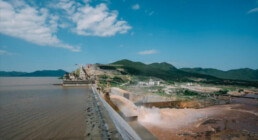
እናም የእነዚህን ሀገራት ማህበራዊ ትስስር ስናሰላስል የጋራ ትስስር አጠቃላይ እይታ እንዲሁም በመካከላቸው ያለው የዲፕሎማሲያዊ ወይም ሌላ ግንኙነቶች ተፅእኖ ምክንያቶችን መለየት እንችላለን። በሶስቱ ህዝቦች መካከል ያለው ማህበራዊ፣ ሕዝባዊ፣ ኢኮኖሚያዊ እና ሌሎች ግንኙነቶች ምን እንደሚመስሉ ለታዛቢዎች የተደበቀ አይደለም፣ ምንም እንኳን በብዙ ጉዳዮች ላይ ውጥረት የበዛበት ዲፕሎማሲያዊ ግንኙነት ቢኖርም ፣ይህም በበርካታ የጋራ ማህደሮች መካከል በተፈጠረው አለመግባባት መሆኑን ደርሰንበታል።
ሆኖም የአንዳንድ ጉዳዮች ክምችት ይህን አለመግባባት በአስደንጋጭ መልኩ እንዲያድግ ቢያደርግም እና የተወሰነ ተፅኖ ቢኖረውም በሶስቱ ሀገራት ህዝቦች መካከል ካለው ጠንካራ ግንኙነት እና ህዝባዊ ትስስር አንፃር ደካማ እንደሆነ ምንም ጥርጥር የለውም።
የሶስቱ ሀገራት ዲፕሎማሲ በብዙ ለውጦች እና ፈተናዎች እንዳለፈ ታሪክ ዘግቦታል። በተለያዩ ጊዜያት ከባድ የሆኑ ችግሮች ቢኖሩም ትስስሩ የሚያደርገውን የህልውና ትግሉ ላይ ያለውን ፅናት ልናይ ችለናል።
አገራችን እየገነባችው ያለው የህዳሴ ግድብ ለረጅም ጊዜ ያለመግባባት ምንጭ ነበር ይህም ፋይል በእኛ ጊዜ የአፍሪካ ትእይንት ርዕስ ለመሆን በቅቷል:: የህዳሴው ግድብ ችግር መሰረቱ እና ውስብስብነቱ ከታሪክ ባይደበቅም ነገርግን በዚህ ፅሁፌ ላይ በልማት፣ በብልጽግና የተሞላ አዲስ ጎህ እንዲወለድ እና የተስፋ ሻማ እንድናበራ በማሰብ እንዲሁም ፍትህ፣ ሰላም እና መልካም ጉርብትና በውዷ አህጉራችን እንዲስፉፉ ካለኝ ፍላጎት አለመግባባታችንን የተረሳ ታሪክ ማድረግን መርጫለሁ። እንደ እኔ እይታ በአፍሪካ ቀንድ እየተከሰቱ ካሉት ፈጣን ክስተቶች የዚያ አካባቢ ህዝቦች ህጋዊ ምኞታቸውንና አላማቸውን የሚያሟላ ብሩህ የወደፊት ተስፋ እንዳላቸው እርግጠኛ ነኝ።
በነዚህ ትልቅ ምኞቶች መጠን ተግዳሮቶቹ እየበዙ መጥተዋል። የታላቁ የሀበሻ ሕዝብ ምን ያህል ብዙ ችግሮችን እንዳሳለፈ ታሪክ ቢዘግብም ነገር ግን ባጠቃላይ የኢትዮጵያውያን እና የአፍሪካውያንን ለውጥ እና እድገት ሊፈጥር ችሏል። አንዳንድ ጎረቤት አገሮች ከኢትዮጵያ ጋር ለረጂም ግዜ አብሮ ለመስራት የሚያስችል የሰለጠነ እና መልካም የሆነ ግንኙነት መፍጠር እየቻሉ ኢፍትሐዊ ታሪክ በመጠቀም ፖሊሲያቸውንና እድገታቸውን ኢትዮጵያን ወደኋላ በማስቀረት ላይ የተመሰረት አድርገዋል።
የታላቁ ህዳሴ ግድብ ፕሮጀክትን አንዳንዶች በተለያየ መንገዶች ለማደናቀፍ እና ለማስቆም ብዙ ጥረቶኝ ቢያደርጉም ነገር ግን ይህን የኢትዮጵያ አገራዊ ህዳሴ ጉዞ ለመቀጠል የተነሳ ቆራጥ መሪ እንዳለን የዘመናችን ታሪክ አስፍኖታል። ይህም መሪ የኖቤል የሰላም ሽልማት ባለቤት የሆኑት ክቡር የኢትዮጵያ ጠቅላይ ሚኒስትር ዶ/ር አብይ አህመድ ናቸው። ምናልባት አንዳንዶች ይህ ሽልማት የተሰጠውን ሰላም በማስጠበቅ ስም የኢትዮጵያን መብት አሳልፎ እንዲሰጥ ነው ብለው ያምኑ ነበር።
እንዲሁም የኢትዮጵያን ሉዓላዊነት፣ ክብርና ህጋዊ ህዳሴ ለመናድ ነው ብለው ያስቡ ነበር!
አንዳንዶችም የውጭ አካላትን አጀንዳዎች ለማሳካት በኢትዮጵያ የውስጥ ጉዳይ ጣልቃ ለመግባት እና የህዝቡን ፍላጎት ለመቆጣጠር በሽልማቱ ጫና ለማድረግ ያስቡ ነበር።
ኢትዮጵያን ፊት ለፊት የመጋፈጥ ሞራል እና ድፍረት እንደሌላቸው ስለሚያውቁ ተላላኪዎችን እና ከጠባብ ጥቅሞቻቸው ጀርባ የሚሹ የሀገርንና የመብት ጥቅምን ቅንጣት ታክል ግምት የማይሰጡ አካላትን እየተጠቀሙ ይገኛሉ።
ነገር ግን እንደ ክቡር ዶ/ር አብይ አህመድ ፍልስፍና ለዚህ ክብር ሽልማት ተገቢ ባለቤት ለመሆን እውነተኛ ሰላም ያስፈልጋል። ያንን ሰላም፣ ፍትህና ሁለንተናዊ እድገት ለማስመዝገብ ፅናትንና ቁርጠኝነትን መጠቀም አጥብቆ ይጠይቃል! ስለዚህም የህዳሴውን ግድብ አስመልክቶ የኢትዮጵያ አገራዊ ጉዞ የጀመረው ከአቻቸው የተከበሩ የግብፅ ፕሬዝዳንት አብዱልፈታህ አል-ሲሲ ፈገግ ብለው ባቀረቡት ከባድ የሆነ ቃለ መሃላ የመፈፀም ጥያቄ ምላሽ በመስጠት ነው።
ይህ የሆነበት ምክንያት የግብፅና የሱዳን ወንድሞች ከጠየቁት አስገዳጅ ስምምነት በላይ በፈጣሪ ስም ቃል ኪዳን መግባት የበለጠ ከባድ እና አስገዳጅ ነው ተብሎ ይታመናል።
አሁንም አገራችንና አመራራችን ከወንድሞቻችን ጋር ያለጥፋትና ጉዳት እንዲሁም ያለቸልተኝነትና ያለማጋነን በመልካም ዓላማና ጉርብትና መስራትን አደራ እንላለን።
እናም በዚህ ቃለ መሃላ ይዘት ላይ በኢትዮጵያ ጠቅላይ ሚኒስትር ሕሊና ውስጥ ከተመሠረተው መተማመን እንዲሁም ለግብፅ ወንድሞች ካላቸው እምነት እና በጎ አስተሳሰብ ያለምንም ማመንታት እና በሙሉ እርግጠኝነት መሐላ መስጠቱ ምንም አልከበዳቸውም። የግብፅ ፕሬዝደንት እና ታዳሚው የተደሰቱበት ቃለ መሃላ የኢትዮጵያ ጠቅላይ ሚኒስትር ንግግራቸውን በሰላምታ እና ለሁሉም ተሰብሳቢዎች መልካም ምኞት የተመኙበት እንዲሁም መልካም ጉርብትና እንደሚቀጥሉ እና በግብፅ ላይ ምንም አይነት ጉዳት ለማድረስ ፍላጎት አለመኖሩን ያካተተ ነበር።
ይህ ብቻ አይደለም ክቡር የግብፅ ፕሬዝዳንት ማንንም ሳይጠይቁ ቃለ መሃላ ለመፈጸም ያላቸውን ተነሳሽነታቸውን በመግለጽ እንዲሁም ለመተባበርና የሁለትዮሽ ግንኙነታቸውን ለማጎልበት ቃል ገብተው ለኢትዮጵያ ፕሬዝዳንት እና ለኢትዮጵያ ህዝብ እናንተም ከግብፆችም መልካምን ነገር ያያሉ በፈጣሪ እምላለሁ፣ በፈጣሪ እምላለሁ፣ መቸም አንጎዳችሁም በማለት ንግግራቸውን ጨረሱ::
የዚያን ጊዜ ህዝቦች ለአስርት አመታት ውስብስብ ሆኖ የቆየውን የተራዘመ ቀውስ በተመለከተ ከዚህ ግንዛቤ በኋላ እፎይ ብለው ተነፈሱ::
የሁለቱ መሪዎች ቃለ መሃላ ምንም አይነት ትንተና ሳንተነትን፣ ቀውሱ በጉዳዩ ላይ የጣለው ነገር ከጊዜ በኋላ ለሁላችንም የሚያረጋግጠው ነገር በሀገራችን ላይ በድብቅም ሆነ በአደባባይ የተነደፉት አጀንዳዎች አንዳንዶች በጊዜያዊነት ከሚያሳዩት መልካም ስነ ምግባር እጅግ ያለፈ እንደሆነ እና ሌላ ጥቁር ድብቅ ዓላማዎችን ለማሳካት እንደሚጠቀሙበት ልናይ ችለናል:: አሁን የጠቀስናቸው አካላት የኢትዮጵያን አንድነት፣ መረጋጋትና ብልፅግና እንደግፋለን እያሉ ነገር ግን በተመሳሳይ መልኩ በውስጥ ጉዳዮቿ ውስጥ ጣልቃ ለመግባት እና የማዳከም እንዲሁም ቀጠናውን ለማራበሽ ኢትዮጵያን መከፋፈል ዓላማ በማድረግ ማዕቀብ የሚጥሉ ናቸው::
በሱዳን ያሉ ወንድሞቻችን ለሶስቱ ህዝቦችና ለመንግስቶቻቸው መልካም ነገር ከማያስቡ ሁለት ፊት ካላቸው የተለያዩ አካላት ላይ ያላቸው አቋም ፅኑ እና ግልፅ አልነበረም:: ኢትዮጵያ በወንድም ሀገር ሱዳን ውስጥ በወቅቱ ሀገሪቱን በወረረ ግጭት ሰላም ፈጣሪ ነበረች። አገራችን አንዳንድ የሱዳን ግለሰቦች በያዙት ተቀያያሪ አቋም ላይ ምንም ትኩረት አልሰጠችም ነበር። የአቋሞቻቸው መጋጨት የሚያሳየው እነዚህ አመለካከቶች በስነምግባር ኬላ ሳያልፍ ሆን ተብሎ ወደ ሱዳን የገባ እንደሆነ ምንም ጥርጥር እንደሌለው ያረጋግጣል።
አሁንም በሶስቱ ህዝቦች መካከል በመልካም ጉርብትና መርሆች ላይ በተመሰረተ በጋራ ትብብር፣ በሶስቱ ሀገራት የውስጥ ጉዳይ ጣልቃ ገብነት ሳይኖር እንዲሁም እነዚያን ህዝቦችን ለሚወክሉ ሚድያዎች ተገቢውን ክትትል በማድረግ በጠንካራ መሰረት ላይ እንደገና በማጤን እና በመገምገም ግንኙነታቸውን ለማሻሻል እድሉ አለ።
ይህንንና ሌሎች በቀጠናው ውስጥ ያሉ ቀውሶችን ለመፍታት የተተወው የድርድር ጠረጴዛ ቁልፍ ይሆናል ብለን እናምናለን። በመጠባበቅ ላይ ያለው የህዳሴ ግድብ ድርድር ፈታኝ እየሆነ

መጥቷል ይህም በብዙ ምክንያቶች የተወከለው ነው። በተለይም፡-
- የሚቲወቁም ሆነ የማይታወቁ አካላት በህዝቦች መካከል በፈጠሩት ግጭት
- የአመለካከቶች እና የአቋሞች ለውጥ
- የሌላውን ተደራዳሪ አካል አቋም ግምት ውስጥ ያላስገቡ ጥያቄዎች መጠየቅ
- በተደራዳሪዎች ላይ የውሸት ቅድመ-ግምቶች እና የተሳሳቱ ትርጓሜዎች እና ትንታኔዎች መስጠት
- ዓላማዎች አስቀድመው ሳይወስኑ ድርድሩ ላይ ግትር መሆን
- ሚዲያዎችን እና ዲፕሎማሲዎችን አሉታዊ እና አሳፋሪ በሆነ መንገድ በመጠቀም ድርድሩን ለማበላሸት እና በድርድሩ ላይ ባሉ ወገኖች ላይ ጫና ለመፍጠር መሞከር ናቸው።
በመጨረሻም ኢትዮጵያ በግብፅ እና በሱዳን ወንድሞቿ ላይ ያላትን በጎ አመለካከት ለአለም እያሳየች እና እያስመሰከረች ያለች ሲሆን፤ ለችግሩ መፍትሄ በመፈለግ ረገድ ድሮም ሆነ አሁን እያደረገችው ያለ እንቅስቃሴ በፍትህ አይን ለሚያይ ግልፅ ነዉ። በዚህ ረገድ በሀገሪቱ ውስጥ ያለው የበላይ አመራሮች ከችግር ጊዜ ጀምሮ እስከ ዛሬ ድረስ የሰጡትን መግለጫዎች መመልከት ይችላሉ። ከዚያም በኋላ ተፉሰስ ሀገራት መግለጫዎች ጋር በማነፃፀር ብዙ ነገር መረዳት ይቻላል። አሁንም አገራችንና አመራራችን ከወንድሞቻችን ጋር ያለጥፋትና ጉዳት እንዲሁም ያለቸልተኝነትና ያለማጋነን በመልካም ዓላማና ጉርብትና መስራትን አደራ እንላለን። ቁም ነገሩ ቀውሶቻችንን መሻገሪያ መንገድ አድርገን ወደፊት መራመድ እንጅ አንድኛችን አንድኛችን ላይ አሸናፊ መሆኑ አይደለም።
Share
Saving Face: Upholding the U.N. Image to the Detriment of Whistleblowers
Mesfin
Tinbite Elias
University of Redlands
Twitter : @TinaLegesse
Whistleblowing has long played an essential role in exposing corruption or wrongdoings by systems where internal monitoring mechanisms have failed. It serves as a tool, though to the detriment of the whistle-blower, to unmask and give the general public an understanding of how and why internal control mechanisms have failed. One must pay closer attention when the United Nations, an entity with varied organs that operates in nearly every nation, fails to meaningfully address concerns and accounts of whistleblowers.
One must pay closer attention when the United Nations, an entity with varied organs that operates in nearly every nation, fails to meaningfully address concerns and accounts of whistleblowers.
The most recent incident that has caught public attention is that of Maureen Achieng, the International Organization for Migration’s (IOM) Chief of Mission to Ethiopia, and Dennia Gayle, Representative at United Nations Population Fund (UNFPA). In an interview with an independent journalist, Jeff Pearce, these two high-ranking UN officials discuss irregular reporting channels established in the months following the onset of Ethiopia’s Tigray conflict in November of 2020. They explain that due to increased humanitarian need, more coordinators were brought into the region to meet the affected population’s needs. However, according to Achieng and Gayle, these new personnel regularly bypassed the existing chain of command, which includes country representatives, and reported directly to U.N. headquarter offices in New York and Geneva.
This unconventional side-lining of heads of agencies hints at the greater internal procedural struggle within the U.N. system. Their account sheds light on the ringing question of alligences in a complex conflict between the elected government of Ethiopia, and the presently recognized terrorist group, the Tigrean People’s Liberation Front (TPLF) who became the defacto administrators of Tigray, and the relief efforts therein. Achieng and Gayle were both placed on administrative leave under a citation of “unauthorized interviews’’ on October 11th and 12th respectively.
What are the United Nation’s own whistleblower policies?
The United Nations claims to extend protection to all staff members, regardless of type of appointment and duration. The policy considers protected activities to be reporting and cooperation pursuant to ST/SGB/2017/2/ Rev.1 where protection is provided when an evidence based report is made internally to the United Nations Ethics Office in good faith and within a 6 month period since awareness of misconduct. The U.N. also allows for external mechanisms of reporting when the reporting is necessary to avoid threats to public health and safety, damage to U.N. operations are eminent, the aforementioned misconduct is in violation of national or international law, or when internal mechanisms prove insufficient.
Though the regulation is extensive, misalignment between policy and practice demonstrates that protection is not guaranteed to those that undermine the greater institution. In fact, a 2015 U.N. report exposed that between 2006 and 2014 the Ethics Office evaluated 403 cases but established only 4 as retaliatory. This outcome left 55% of staff believing there would be little to no protection of whistle-blowers resulting in diminished confidence of the internal reporting mechanism.
The following three high profile whistleblower cases (James Wasserstrom, Miranda Brown and Emily Reilly) illustrate why there is staff reservation against reporting, and flaws with the implementation of the whistleblower policy of the U.N.
In 2007 James Wasserstrom, while serving as the head of the U.N. Office for the Coordination of Oversight of Publicly Owned Enterprises in Kosovo, reported concerns of corruption between senior U.N. officials and top politicians over a proposed power plant and mine. His action was met with retaliatory measures like non-renewal of employment contract and the closure of his office which he took to the Ethics office.
However, Wasserstrom’s claims were dismissed by a secondary evaluation system (U.N. Investigation Division) forcing him to take the case to the U.N. Dispute Tribunal in 2009. By 2012 his case was resolved with compensation of 65,000 (USD) in damages. It’s important to note the time it took the U.N to process cases and equally important that the measures taken prove to not be heavy enough deterrents for international organizations to refrain from future misconduct. Conversely, the consequences paid by whistleblowers are careerlong.
What is clear with these precedents is the converse relationship between weak deterrents for the institution
contrasted with long term reprisal for whistleblowers cultivating a culture of fear and acceptance of wrongdoing.
Another such case is that of, Miranda Brown who in 2014 was the Director of the Africa Branch at the United Nations High Commissioner for Human Rights (OHCHR). At the time, her office received a report from a human rights officer in Bangui, CAR in which he documented sexual abuse of young boys in an Internally Displaced Persons camp by U.N. peacekeepers. Brown and her then supervisor, Anders Kompass, forwarded this report to OHCHR in Geneva but saw no measures taken to rectify the situation. Thus in July 2014, Kompass and Brown disclosed the allegations of abuse to French authorities and law enforcement. Within months, Brown was terminated and Kompass suspended pending an internal investigation. Though Brown’s claims were validated by an independent panel convened by Member States, she was blacklisted and her contract never renewed.
Similarly, Emily Reilly, while working at OHCHR in 2013 received an email in which she was asked by Chinese officials to turn over names of human rights defenders who planned to attend a Human Rights Council (HRC) meeting in Geneva. Believing the request to be against OHCHR mandate and HRC rules, she reported her concerns to her seniors but learned the names were already handed over. The misconduct occurred to limit mistrust between China and the agency. Challenging this action resulted in reprisal in the form of exclusion from meetings, dissemination of false reporting and performance reviews which included false and prejudicial information. After 5 years of engaging with the Ethics Office, Reilly is recognized as a whistleblower, however she still has multiple active proceedings and was terminated from the U.N. mid November of 2021.
What is clear with these precedents is the converse relationship between weak deterrents for the institution contrasted with long term reprisal for whistleblowers cultivating a culture of fear and acceptance of wrongdoing. Organizations that have the power to validate and redefine misconduct, are inept at implementing sufficient protection of those that expose the corruption of the institution itself. Such is the case of Achieng and Gayle where their act of whistleblowing was redefined as an unauthorized interview. Achieng and Gayle’s case is still unfolding. Thus far, both officials have been placed on administrative leave and have been recalled from Ethiopia. The different U.N. agencies involved have distanced themselves from the officials citing the recording as antithetical to U.N. principles and values. Unlike the email evidence Reilly gathered, Achieng and Gayle can only refer to a timeline signifying change in normal operating procedures and the hearsay that the sidelining is due to assumed political preference.
Though it is yet to be determined if the UN regards Maureen Achieng and Dennia Gayle as legitimate whistle-blowers, granting them the protection they deserve, the Ethiopian public is witness to two major pitfalls. One, the fact that questions of corruption were raised by high ranking officials where the greater UN was accused of taking a political stance which might affect the outcome of a war; raising issues of sovereignty, and the unintended outcome of international interventions in protracted conflicts. Secondly, that challenging the status quo is not without repercussions, even in an internationally trusted body like the U.N.
The U.N. is burdened to not only uphold the standards but to be a bastion of good practice. Ethiopians and Africans alike, have made their protests public over Achieng and Gayle’s removal through the hashtag “#IamMaureenAchieng”. This timely public outcry maybe the only path of action the public has to protect whistle-blowers, but it might also serve as a wake up call for the U.N. to re-evaluate its policy as reservation towards international aid and development agencies continues to rise.
Share
Western Framing Ethiopia’s Tigray Crisis
Mesfin
Bethlehem Mehari
International Economics and
Conflict Management
Twitter : @Beth_Mehari
The West has long seen African political development through a myopic lens of self-interest and suspicion. A fact made all the more evident in how Western governments, and their media, frame African political development; be it transition or turmoil. Political upheavals and security deterioration in countries like Libya and Somalia are often discussed within the scope of migration, or the socioeconomic threat they pose to the West. While self-interest at the core of Western diplomacy is not inherently harmful to African States, the conflict in Ethiopia’s Tigray region elucidates the potential dangers of Western partisanship in Africa’s political development. In the case of Ethiopia, we have witnessed coercive diplomacy through individual sanctions by states outside of the multilateral framework.
Since the onset of conflict prompted by attacks on military stations in Ethiopia’s Tigray region on November 4th, 2020, the United States and the European Union have adopted a strategy of consistent pressure on the Ethiopian government and sought partners in the Horn Region to find a solution to the crisis. The mainstream media, including those under the congressionally funded Corporation of Public Broadcasting (CPB), news publications (Washington Post, Reuters, the Economist, Foreign Policy) as well as notable human rights watchdogs like Amnesty International have all followed suit.
These strategies have also led to the emergence of a parallel narrative of the conflict
Ethiopians, citizens and officials alike, have spent the better part of a year addressing accusations levied against the nation primarily from the United States, Europe, the mainstream media, as well as international agencies, notably UNDP, WFP, and UN Women that that have persistently called for a cessation of hostilities on humanitarian grounds. While many claim that the West harbors a nefarious plot to weaken Ethiopia’s central government, others maintain that there is simply an ignorance of the facts on the ground.
While the motivation of the United States and the European Union requires closer scrutiny, it is important to identify recurring strategies Western powers and media employed that have prolonged the conflict and increased human suffering in Tigray and neighboring Amhara and Afar regions. These strategies have also led to the emergence of a parallel narrative of the conflict. Hence, instead of further entrenchment into the cyclical pattern of offense and defense pattern, let us examine recurring themes in the West’s framing of Ethiopia’s Tigray crisis.
In identifying recurring themes in the west’s approach to the conflict, ordinary people as well as government officials will break away from the unproductive cycle of offense and defense.
Deny, Deny, Deny
Since the onset of conflict in November of 2020, the question of “who initiated the war” has grown increasingly vague. Though high-ranking TPLF officials like Sekoture Getachew, Getachew Reda, and General Tsadkan Gebretensae, have not only declared their role in initiating hostilities but have also professed their opposition of the governing party and stood in opposition of the continued statehood of Ethiopia; a disclosure that has caused public confusion and turmoil domestically. Inquiries as to “who initiated the war” would have been a laughing matter in the early days of November 2020. However- the global media machinery, as well as Western powers have effectively muddied the waters in their endeavor to rationalize TPLFs motivations in not only initiating the conflict but also prolonging it. The United States, and most notably Ireland, seem to have tabled this important detail in their crusade for humanitarian access.
This is only the start of a series of denials that have baffled the Ethiopian public. Though the likes of the Associated Press and the New York Times have produced sensational pieces on details like recruitment of child soldiers and potential combatants in UN refugees camps in Sudan,
there is barely an acknowledgment of the use of child soldiers, or UN Refugee Agency arguably abetting combatants. Equally, after the Government’s announcement of a unilateral withdrawal. Many in the international community seem oblivious to TPLF’s incursions into Afar and Amhara regions. We have, instead, seen the use of vague terminology like “expansion of the war” to imply further culpability of the Federal Government.
Deflect
Owing to the public outcry on social media platforms, the United States has sought to rationalize some of TPLF’s actions as a response to “a siege”. Criticism for the diverting aid materials for recruitment, use of child soldiers, and guerilla-style attacks on innocent neighboring communities have all been attributed to the Federal Government’s refusal to open its borders. This refusal to acknowledge TPLF crimes, while magnifying the Federal Government’s legitimate measures, is designed to further exacerbate the war and keep the public in a perpetual blame game.

Delegitimize
Minimizing the undisputed legitimacy of the ruling government, the United States and the EU have levied all their accusations at the foot of a single individual, the Prime Minister. The United States and many EU states are yet to acknowledge Ethiopia’s relatively free and fair elections in June of 2021; it is likely for this reason that they continue to seek partners in the region without meaningfully engaging the elected government of Ethiopia. . Additionally, there is a marked shift toward a cold-war era dynamic where the Tigray conflict is discussed within the scope of a Chinese expansion or the growing influence of Russia in East Africa. Secondly, deliberate tarnishing of Ethiopian institutions like the ENDF, the Office of the Prime Minister, and Ethiopia’s Human Rights Commission is yet another attempt to Delegitimize the Government of Ethiopia.
Disinform
The unilateral withdrawal of federal troops is a noteworthy incident of deliberate disinformation. Following the West’s outcry for cessation of hostilities, the withdrawal of federal troops was depicted in one of two ways. First, that the central government was severely weakened to carry out military activities. And second, that withdrawal of federal forces is a de facto siege imposed on the Tigray Region; thereby justifying TPLFs operations in Afar and Amhara regions. This deliberate change in narrative angered the Ethiopian public as it conveniently masks the plight of over two million victims of TPLF violence in the Amhara and Afar regions. The United States embassy in Addis Ababa is yet another actor that continues to disseminate unsubstantiated reporting on the nation’s safety and security which only serves to stoke panic.
So, why is it important to identify these deliberate strategies deployed by Western powers and their media machinery? First, the people need to regain their voice in a conflict where many claim to speak on the Ethiopian People’s behalf. In identifying recurring themes in the west’s approach to the conflict, ordinary people as well as government officials can break away from the unproductive cycle of offense and defense. Instead, the nation can collectively move toward a much-needed national dialogue rooted in firm principles: both of the Ethiopian legal code as well as customary international law.
Secondly, instead of rectifying factually inaccurate international reporting and levying accusations on foreign governments, the Ethiopian public needs to hold its own elected officials responsible, including demands for increased access to information and greater transparency.
Ethiopian leadership through the ages. Confronting or conforming to the past?
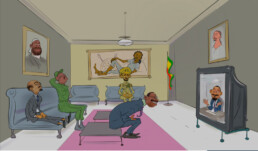
Share
Conversation with Dr. Tirusew Asefa
Mesfin
Climate and water resources expert based in Florida
HORN REVIEW:Dr. Tirusew, thank you for taking the time to speak with us on the topic of the Grand Ethiopian Renaissance Dam (GERD) and the issues surrounding it. Please give our readers a summary of your background.
Thank you for having me. I primarily work with a water company that supplies nearly 2.4 million residents in the Tampa, Petersburg- Clearwater Metro Area. More specifically, I work in a department that aids with modeling and decision support in areas like water demand projections for the next 20-30 years, demand and supply-side management of the various water sources, as well as assessments of the impact of climate change on water resources. Additionally, I give a brief course at the University of South Florida in the areas of water demand and supply management, forecast, and immediate effects of climate change. I also teach a postgraduate course on water, energy, and climate at Pan-African University’s Algeria campus. In this course, I give an overview of adverse effects of climate change like floods, and drought, and effective measures of combating them.
HORN REVIEW:As a climate and water resource management expert, summarize for us the core benefits of a hydro-powered dam as compared to other sources of energy like fossil fuel and nuclear power.
From a clean energy perspective, there are numerous benefits. While some emphasize the negative aspects like carbon and methane emissions after filling reservoirs; these effects, however, are negligible compared to emissions from fossil fuels and other energy resources used around the world. In terms of reducing emissions, hydropower is the cleanest. In this aspect, a project like GERD is not only helpful to the country but also to the world as it helps curb global emission levels. Ethiopia has six more tentative projects that are to generate an additional 25,000 megawatts of energy and help meet the population’s demands.
A project like GERD also has immense benefits both in terms of employment and engaging local communities. Thus far, the emphasis on labor has been on the construction of the dam itself.
However, one would expect further job creation in the construction and maintenance of power infrastructure that is to distribute electricity throughout the nation.
I recently had a conversation with a young lady in high school and I inquired into her future career aspirations. To my surprise, she answered that she hopes to become an electrical engineer as she foresaw the immense labor and expertise needed to meet and sustain our population’s electricity needs. Studies have shown that Ethiopia can easily double its output from its existing light industry solely by having a consistent electricity supply. Experts have also projected that every dollar invested in electricity generation, has an additional $7 worth of associated benefit because of its cascading effect across sectors.
HORN REVIEW:What, in your opinion, accounts for the disconnect between the global move towards environmental consciousness and lack of support, financial or political, for clean energy initiatives in developing countries like Ethiopia. What accounts for this disconnect?
I believe this disconnect has a lot to do with the will and profit margins of special interest groups and goliath-sized lobby firms. It is no secret that many of the industrialized nations spearheading the global effort for clean energy continue to be large emitters with no foreseeable plans to change their path. With this reality in mind, I am also a firm believer that clean energy initiatives should never be at the cost of the poor. The cost of transitioning to clean sources of energy should be shared with nations that have achieved industrialization decades ago. This is akin to changing the rules of the game in one’s favor. Africa’s combined emissions, per capita, remain minuscule as compared to other nations and corporations, hence the international framework has to be one of practical assistance and not one of dictation of rules.
It is no secret that many of the industrialized nations spearheading the global effort for clean energy continue to be large emitters with no foreseeable plans to change their path.
HORN REVIEW:How would you summarize some of the terms in the ongoing GERD negotiations? What are the buckets of issues?
The issues are different for both Sudan and Egypt and they need to be addressed separately. I do not believe Sudan disagrees with the benefits it would reap from GERD. Sudan would like to be assured that it would get a consistent supply of water throughout the year given that nearly 70% of Blue Nile water flows in a mere 4 months. Due to this fact, Sudan faces recurrent floods during these months. For example, the 2019 flood in Sudan is considered a once in a 100-year flood; coincidentally, 2019 was the year Ethiopia completed its first filling of the GERD reservoir. Sudan not only needs assurances that there will be regulated flow, but also information on the amount of water released given that their nearest dam only retains about 7 billion cubic meters.
HORN REVIEW:What is the alternative to Sudan’s two concerns without the GERD?
GERD ensures that Sudan will face significantly fewer floods if any. Without it, Sudan would continue to manage extreme floods. And concerning information on water levels, well- they simply would not have any without GERD. As far as I know, the Ethiopian government does not object to Sudan’s demands. However, Egypt’s demands are far more demanding and non-reciprocal as they are not only asking for daily, monthly, and annual data- but they also demand reports on water quality levels. However, Egypt seems unwilling to share similar data on the water that reaches them. Contrary to Egyptian claims, I argue that we do not even know just how much water is reaching Egypt and the amount that is in the Nile basin as a whole. Though Egypt has always maintained that the total amount is close to 85 BCM, Satellite information suggests that it is no less than 97 BCM.
Additionally, Egypt’s core demand has to do with extended periods of drought periods and their demands to have a fixed amount of water released permanently. A binding agreement would dictate the amount of water Ethiopia should release ad infinitum; irrespective of climate change which equally affects Ethiopia, increasing needs for potable water, or national interests for commercial agriculture. Experts will tell you that one would need a few billion gallons of water to use for mass agricultural production; given that the GERD is located at the cusp of the Ethio-Sudanese border, this would mean that Ethiopia’s potential for such endeavors would adversely impact its own power generation. Instead of cooperating on combating water shortage due to factors like climate change and recurring droughts, Egypt’s terms essentially force Ethiopia to release a fixed amount of water, thereby acting as Egypt’s secondary reservoir. As I said, Ethiopia will not deliberately use excess amounts of water upstream of the GERD precisely because it severely reduces the water supply that is meant to go into the turbines for power generation. If Egypt’s suspicions were valid, GERD would be located further inland to facilitate an exorbitant level of agricultural productivity. Their terms are meant to limit Ethiopia’s ambitions to power generation by cornering the current government into disavowing any future ambitions of using the Nile waters for consumptive purposes.
A binding agreement would dictate the amount of water Ethiopia should release ad infinitum;
HORN REVIEW:What confidence-building measures do you propose to build trust between the three nations and their respective populations?
It is important to note that this issue should not be seen as a political issue, but as a people-to-people issue. It is important to frame the larger water story and how it fits into the larger social, economic, and political context of the three countries. What we are seeing is the contrary; politicians and media personalities have politicized the project and seem to be the drivers of this conversation. It is also the responsibility of the professionals to clearly articulate the larger water story and contextualize it in terms of water, food, and energy security for all three nations.
It is important to frame the larger water story and how it fits into the larger social, economic, and political context of the three countries.
